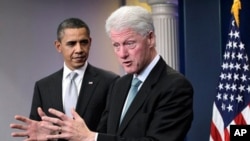President Barack Obama has received the endorsement of former President Bill Clinton for the controversial tax deal the White House negotiated with congressional Republicans. President Obama and Mr. Clinton made a surprise appearance in the White House briefing room on Friday.
The former president said it is clear that all sides in the debate over the proposed tax bill, which the White House and Republicans are calling a framework agreement, see things differently.
Estimated to cost more than $800 billion, the package would extend current lower rates approved under President George W. Bush for all Americans, including the wealthiest, in return for extending government benefits for the unemployed and other provisions the White House calls crucial to avoiding another recession. It would also add to the government deficit and $13.8 trillion national debt.
Mr. Clinton said it is important to achieve what he called principled compromise in a time of divided government, without which he said there would be paralysis. "The agreement taken as a whole is, I believe, the best bipartisan agreement we can reach to help the largest number of Americans and to maximize the chances that the economic recovery will accelerate and create more jobs and to minimize the chances that it will slip back," he said.
Asked by reporters about intense negative reaction from many Democratic lawmakers, Mr. Clinton said he hopes they will support it.
Democrats in the House of Representatives formally rejected the deal. Democratic House Speaker Nancy Pelosi said discussions would continue with the White House and Republicans to improve the proposal before the House considers it. The U.S. Senate is expected to take a first test vote on Monday.
On Friday, a fierce opponent of the tax deal, Vermont Independent Senator Bernie Sanders, began what he vowed will be an all-out effort to block the legislation. "The agreement that they reached is a bad deal for the American people. I think we can do better," he said.
President Obama said the tax deal was one topic in an Oval Office discussion with Mr. Clinton that lasted about 90 minutes. He reiterated what he sees as the positive points of the deal.
"Billions of dollars in payroll tax cuts that can immediately help rejuvenate the economy, as well as tax cuts for middle class families, unemployment insurance for folks that desperately need it, credits for college, child tax credits, as well as a range of business tax credits, are so important to keep this economy moving," he said.
President Obama finds himself in a situation similar to Mr. Clinton in 1994, when in mid-term congressional elections, Republicans won control of the House of Representatives and the U.S. Senate, threatening his agenda.
Mr. Clinton was forced to come up with a new strategy, moving more to the political center and working with Republicans. He won re-election in 1996.
President Obama faces similar decisions, facing a Republican majority in the House of Representatives in January in the wake of the mid-term elections last month. In the Senate, Democrats will have a narrower majority, but Republicans have already shown their ability to block Obama legislative priorities there.
Former President Clinton said it's clear President Obama will have more difficulty negotiating in January, but he disagreed with those who suggest Mr. Obama's compromise with Republicans has damaged his political prospects.
The former president emphasized what he sees as most important now for the country. "The economy first, we can't go back into a recession, we have to keep crawling out of this mess we are in. And this is a good first step," he said.
Mr. Clinton also talked about Haiti during his surprise appearance before the media at the White House. And he reiterated his support for U.S. Senate ratification of the New START nuclear arms reduction treaty with Russia.
President Obama's meeting with former President Clinton was the second time in a week he has met with a former president. He met with former President Jimmy Carter last week. The contents of those discussions are unknown.
Bill Clinton: Tax Deal Best That Can Be Achieved
- By Dan Robinson





